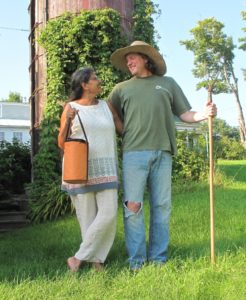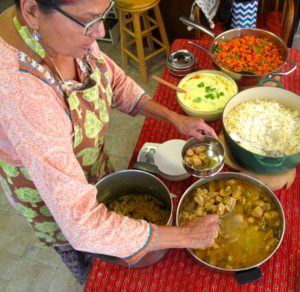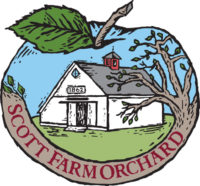Emmett Dunbar’s wide-brimmed straw hat, the one he wears working his blueberry bushes, is the one constant since he began a farming life in Vermont 20 years ago. His wife, Lini Mazumdar, in her apron, divides out tiffins and walks them to the farm fridge for pickup—an everyday scene that doesn’t reflect all that’s changed on the farm over the past 20 years.
Lini came to the U.S. from her native Calcutta, West Bengal, India, when she was 18. The couple, who own Anjali Farm in South Londonderry, met in California when she was studying with herbalist Karyn Sanders and working as a translator for Dr. Yeshi Dhonden, former physician to His Holiness the Dalai Lama, in Oakland.
He was managing a farmers’ market there. Subsequently she was certified by Michael Moore’s Southwest School of Botanical Medicine, in Bisbee, Arizona, after which she joined Emmett in Vermont, because he …
“I said I would grow her herbs for her,” said Emmett.
Emmett, now 46, and Lini, 58, moved into their 19th-century farmhouse that had an attached barn on a 10-acre slope above the West River, which was previously owned by Emmett’s mother. Now the couple and their daughter, Anisha, 12, live in one of three apartments in the farmhouse. They rent out the other two.
The farm had not been worked for a decade so they had their work cut out for them. They restored the 19th century barn, brought utilities to the outbuildings, built four greenhouses totaling 4,000 square feet, and a farmstand. It was a big undertaking and huge investment that was paid for with a $100,000 matching USDA grant.
First in the ground was garlic and Lini’s medicinal garden. Then they expanded to certified organic heirloom vegetables, culinary herbs, berries and fruits, then added a small flock of chickens for eggs and to help them work and fertilize the land.
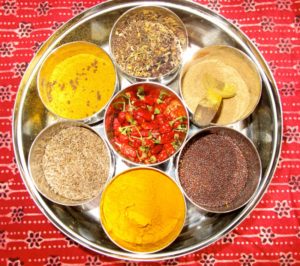
Panch phuran (Bengali five-seed mix), cumin powder, black mustard seeds, turmeric powder (via newforestorganics.com), cumin seeds, and homemade spicy curry powder mix all ringed around Anjali Farm organic dry Thai chilies.
They made specialty food products from their produce, fruits and herbs, which they sold at local inns, restaurants and co-ops; they ran a CSA; they hosted students and WOOFers (named for WWOOF, a worldwide movement linking volunteers with organic farmers and growers to promote cultural and educational experiences) in the field and barn classrooms, gave farm tours, farm to table dinners and other special events and workshops on organic agriculture to the public.
“We were selling all of our products within a 30-mile radius at one time,” he said. “That was the goal. We were giving human beings and animals the joules of the sun’s energy with a positive carbon footprint.”
At its peak of production, Anjali Farm (Anjali is a Sanskrit word meaning “divine offerings to the deities,”) had 50 CSA shareholders and sold products to 20 restaurants and four farmers’ markets as well as at their own farmstand on the property.
They found themselves working more than 100 hours a week for easily over a decade but all of the hard work was not providing enough profit to make it work. The revenue was there, but the costs and crop loss due to weather and pests forced them to earn money off the farm periodically from the beginning.
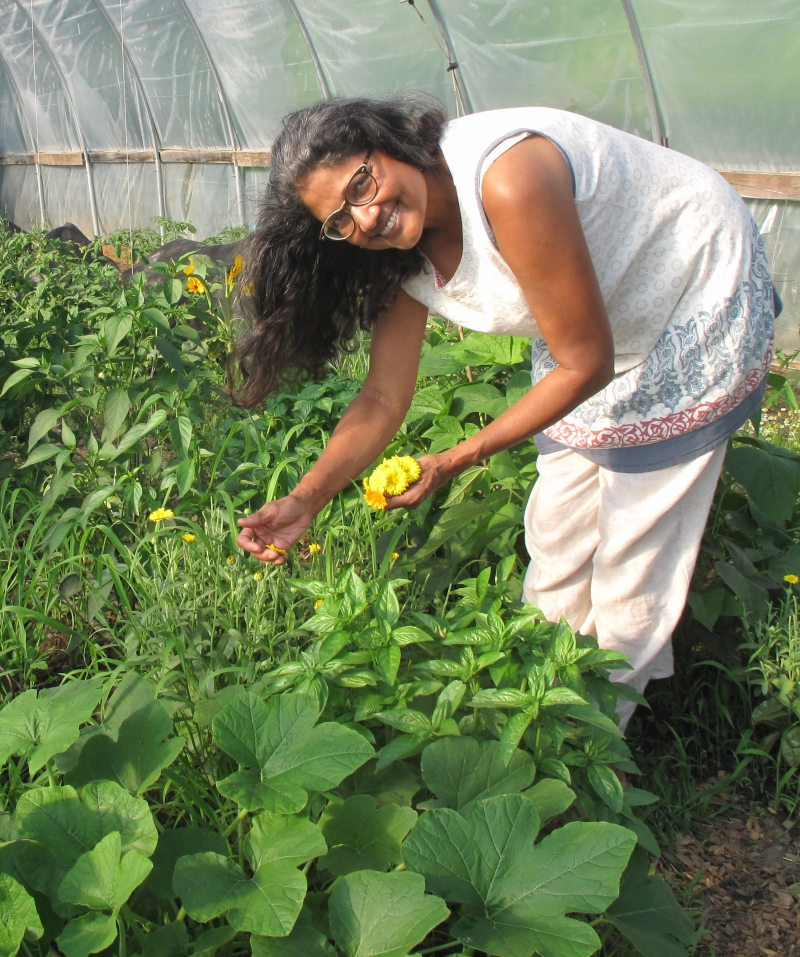
Lini, a holistic counselor, herbalist, certified Ayurvedic nutritionist, and professional cook and caterer, has turned her passions and education into several businesses.
In 2004, the couple began to scale back their operations. Six years later, Dunbar started his master’s in management program at Marlboro College.
“It taught me what I needed to do to make this work,” he said. “We shut down to next to nothing in 2010, while I was in school thinking the farm was done. It emerged again because I learned to streamline and eliminate.”
Today what sustains them is a more diverse, but more specialized, variety of products and activities.
Lini, who is a holistic counselor, herbalist, certified Ayurvedic nutritionist, and professional cook and caterer, has turned her passions and education into several businesses with Emmett’s help.
“I’m the producer of ingredients and she’s the producer of products with ingredients,” Emmett said of their symbiotic business relationship. “I’m in touch with the cycle of nature. She’s in touch with plants and plant medicine. She’s the micro-cycle and I’m the macro-cycle.”
Lini’s Lotus Medicinals, “farm to skin” products, include medicinal salves, creams, a popular insect repellent called Bug Off, and massage oils, tinctures, teas, aromatherapy sprays and flower essences that are sold throughout Vermont at food co-ops and farmers’ markets, local markets and via mail order.
She also teaches Ayurvedic classes.
They continue to grow pick-your-own blueberries and began to focus on saving seeds. Roughly 90 percent of their crops come from their own seeds.
While visiting the farm, Lini was preparing Indian tiffins—Indian meals packed in tiffin carriers, which are pre-ordered and picked up on the farm. Tiffins are stacks of interlocking containers for two. She says that the idea came while shopping in Brattleboro at an Indian imports store where she happened to see the containers and bought 20 of them. The purchase inspired her to launch the Indian cooking business in 2012.
Lini describes her food as home-style Indian with a seasonal and local Vermont twist. Her ingredients are organic and fresh, local and seasonal. She sends out a weekly reminder to her list of customers who place their orders with her by Monday, she cooks on Tuesday and tiffins are picked up at the farm on Wednesdays. The clean and empty containers are dropped back off, making it a sustainable venture with no waste.
In addition to cooking for her tiffin business, she caters and runs private and public cooking classes.
Despite the long hours and hard work, neither of them could imagine not farming and not farming anywhere else but in Vermont.
“It may not be an easy life, but it’s a real life and you learn to adapt,” Lini said.
“You’re in nature and that’s a healthy way to live and bring up children and teach them about food. I taught our daughter about cooking, chopping and making products while Emmett taught her how to plant and harvest,” she added.
Emmett is more than a small Vermont farmer. He’s a mover and shaker in the industry. A pioneer in the development of the alternative food economy in the United States, he has worked in agriculture for 25 years. After starting his career in New York City’s Greenmarket Farmers Markets, he created and managed the Aquidneck Growers’ Market in his native Newport, Rhode Island.
After moving to Vermont in 1998, he was the Northeast Organic Farming Association of Vermont’s first farmer’s market coordinator, where he helped to create the Vermont Farmers Market Association.
“The working landscape and small farms in Vermont are still the best incubator for having people live in Vermont and be in Vermont and make business in Vermont,” he said.
When not underneath his straw hat pruning blueberry bushes, he works as a business consultant in risk evaluation and change management for small, mission-driven companies. He most recently worked as development director for the Town of Rockingham.
“It’s Windham County that’s kept me here. I’ve reinvested in Vermont and Windham County,” Emmett said
“Lini and I have not just worked to develop our farm’s products for ourselves, we have been instrumental in creating the alternative food and local agricultural economy in Vermont,” he added.
“We have worked as a team for nearly 20 years to restore and steward a stereotypical New England side hill farmstead using biodynamic farming methods. After a rewarding and challenging career, one thing remains true: a farm is never done, but a business plan can be completed. We have written and satisfied several over time. We’ve learned to not be afraid of change in our dream—and more than ever we believe in Vermont,” he said.
For more information, visit http://www.anjalifarm.com.


